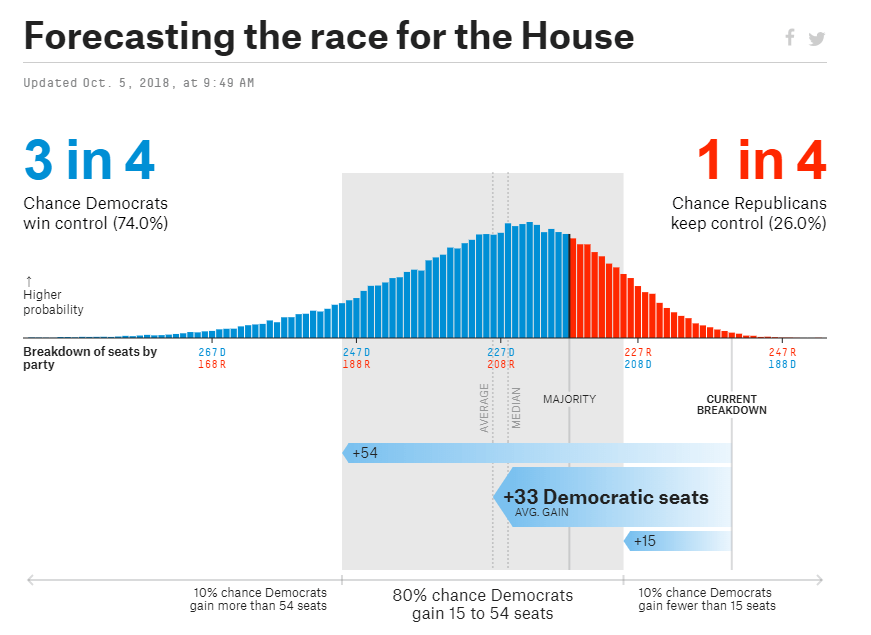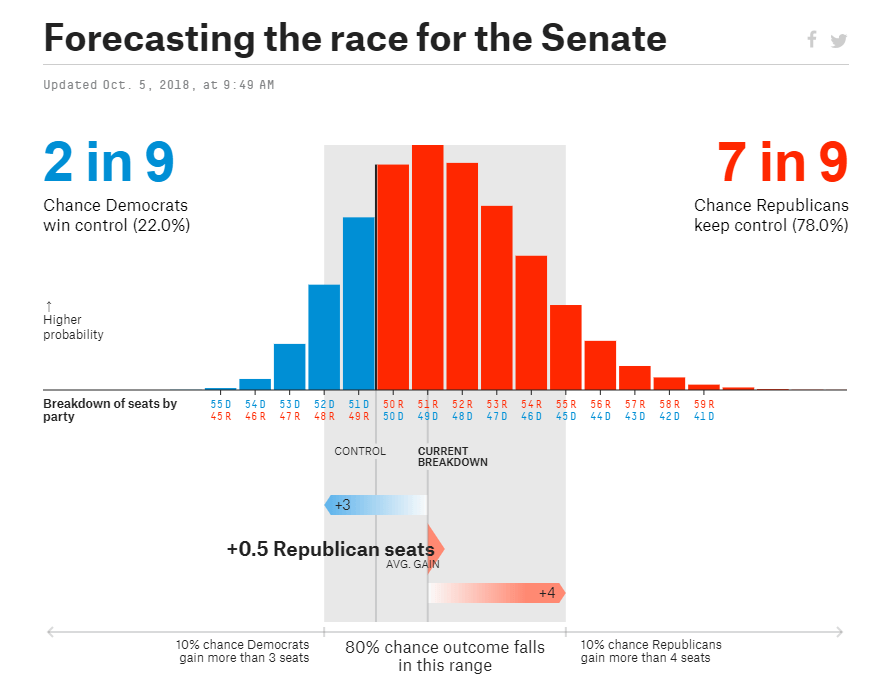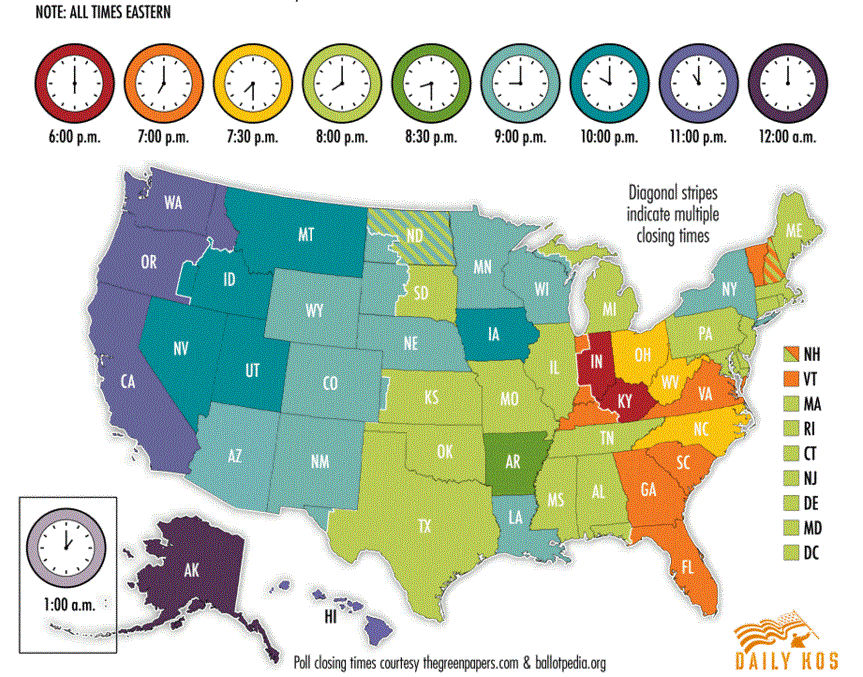- The US mid-term elections may end the full Republican domination.
- Trade, tax, and regulation are at stake, and the US Dollar could rock.
- Here is everything you need to know ahead of the big event.
1) Who is up for election and what can change?
American citizens will vote on all 435 members of the House, the US lower house and 36 out of 100 seats in the Senate, the upper chamber. Republicans control both chambers and also the White House. President Donald Trump is not up for re-election.
The Budget process begins at the House while the Senate is responsible for nominations. Both chambers have other functions as well. For significant laws such as healthcare and taxes, the approval of both chambers an the President are all needed.
According to the latest opinion polls, they are set to lose the House to the Democrats but retain their slim majority in the Senate.
2) Why should forex traders care?
Politics have a growing influence on markets since Trump’s election. His tweets, even as President-elect, were incendiary. Since coming into office, it wasn’t just his tweets but also his deeds in three fields. All impact the economy, thus impacting the Fed’s decisions and the US Dollar.
a) Tax Cuts 2.0
Trump signed into law a significant tax cut that Republicans pushed forward. Corporates and also some consumers have more spare cash in their pockets. Together with extra fiscal spending that was designed to please quite a few members of Congress, the US economic policy is very expansionary. While US government debt continues ballooning, the economy is doing quite well.
Growth that was mostly slow since 2009 has accelerated. This has prompted the Fed to be more hawkish, accelerating the pace of rate hikes and considering a tight monetary policy after years of an expansionary one. The rising debt pushes bond yields higher, also underpinning the greenback.
Republicans are touting a second package of tax cuts, sometimes dubbed Tax Cuts 2.0. On fiscal policy alone, a Republican victory is good for the US Dollar, and a Democrat victory would be bad for the greenback.
b) Trade
Here, the picture is a bit more complicated but could yield the same result: a stronger US Dollar if Republicans win, and a weaker one if Democrats win.
Trump’s tariffs on China have hurt the global economy and sent the US Dollar higher. If the House is controlled by Democrats, they could limit his ability to slap tariffs. On the other hand, they could also block any trade deals. The new NAFTA accord, called USMCA, needs approval by Congress. All in all, Democrats are more trade-friendly in the era of Trump than Republicans that were traditionally more pro-trade.
Many assume that part of Trump’s tough stance on trade stems from political reasons: to fulfill elections promises to convince his supporters to get out and vote. And after the elections, he may ease the pressure and revert to a more pro-trade stance. In this case, it does not matter who wins. It is important to remember that Trump is unpredictable.
c) De-regulation
Markets love the de-regulation enacted by the Trump Administration. Most of the work is done by government bodies and not by the legislature. Nominations to the top jobs are approved by the Senate. If Democrats also win the Senate, they could block new appointments.
The bigger problem for markets will be if Democrats block any significant law that Republicans would want to pass, such as an amendment to the Dodd-Frank Act which regulates the financial sector. Such a move is not on the cards. The impact of regulation is not as significant as fiscal policy and trade, but the outcome is similar: Republicans win = USD positive, Democrats win = USD negative
3) What scenarios can we expect?
a) Democrats flip the House, Republicans retain the Senate
According to opinion polls, this is the most likely scenario. Many voters are angry with Trump and will vote for the Democrats. Frustration about his style, immigration policy, and also about higher prices that are an outcome of the tariffs fuel anger. All this is despite the booming job market. Democrats are projected to have an advantage of around 8% over Republicans which should be enough to win the lower chamber.
Source: fivethirtyeight.com
The electoral map favors Republicans due to the tendency of Democrats to concentrate in bigger cities and Republicans in smaller ones. Also, some local Republican lawmakers tilted the division of districts to favor their party, a process known as gerrymandering. However, a significant advantage of 8% should be enough.
The Senate is a different story. Only 36 out of 100 Senators are up for re-elections, and the vast majority of them are Democrats. Polls suggest some incumbents on both parties may lose their seats, but there is a good chance that the Republicans will manage to maintain their slim majority.
Source: fivethirtyeight.com
If Democrats win the lower chamber, any new major legislation will be blocked, but Trump’s nominations will still be approved by the Senate. The parties could find a way to compromise and get laws passed in both chambers. The current political climate does not suggest compromises, but with each party controlling a different chamber and a desire by voters to see a less-toxic scene, anything can happen.
The scenario has a high probability.
b) Republicans hold onto both chambers
In case the polls are wrong or that Democrats or that a few key races are won by Republicans by a slim majority, the US will have full Republican control for another two years.
In this case, they may lose a few seats but maintain 218 or more to hold the House. Every new legislation will be more problematic, and if Democrats win the popular vote in the House elections, it will make life more difficult. Nevertheless, markets will only care about who has the majority.
Republican control will smooth the process of enacting further tax cuts. If Republicans lose some seats, which is quite probable, they may want to restrict Trump just a bit, to improve their chances in the 2020 elections.
This scenario has a medium probability.
c) Democrats sweep the Senate too
In case of a considerable “blue wave,” Democrats will unseat Texas Senator Ted Cruz, win Jeff Flake’s open seat in Arizona, and win other places without having incumbents losing.
Congress was entirely controlled by Republicans in Obama’s last two years, halting any new legislation. Democrats would have their opportunity for payback, making life miserable for Trump. There is always a chance they will find a way to work with Trump on a few issues that they can agree on. However, they will be emboldened by the party activists to strike a tougher tone against the President.
This scenario has a low probability.
4) How will currencies react to each scenario?
USD in general
As described earlier, a Republican victory is generally USD-positive, and a Democrat win is USD-negative. The degree of reaction depends on the outcome. In the unlikely case that Republicans win seats in either chamber, the greenback could soar. If they lose some seats but maintain the majority, the USD is also likely to enjoy considerable gains.
In the more likely case that the Democrats win the House, the US Dollar will likely drop, but as this scenario is mostly priced, the reaction will be relatively muted. If the Dems also take the Senate, the Dollar’s fall could be quite substantial.
EUR/USD and GBP/USD
The major pairs will likely provide a straightforward reaction, moving with the general trend. However, if the Italian issue remains a burning one, the EUR/USD could be more vulnerable than others to a Republican win and will be unable to capitalize on a Democrat win fully.
Brexit remains the central theme for the British Pound. If a Brexit deal is struck before the mid-terms, Sterling will weather any Dollar storm resulting in a Republican achievement and will beat its peers if Democrats win. However, if the chances for a “Hard Brexit” rise, Sterling may be unable to capitalize on a Democrat win and will tumble on a Republican one.
USD/JPY
The Japanese Yen is a safe-haven currency that attracts flows on bad news. If Democrats win the House, the greenback will fall across the board, and the Yen is unlikely to stand out from the crowd. But if Democrats also win the Senate, the Dollar may find it hard to beat the Japanese currency as concerns about an immediate halt to Trump’s expansionary policies may send month to the safety of the Yen.
If Republicans retain their majorities, the greenback will rise, but the effect against yen may be diminished on fears that Trump will feel he has no limits on the trade wars. All in all, the situation is more complicated with the USD/JPY, and perhaps it is not the best pair to trade.
Commodity currencies
Commodity currencies and especially the Australian Dollar are more sensitive to trade wars. The AUD/USD could be the biggest loser if Republicans retain control and go after China., Australia’s No. 1 trading partner.
If Democrats win the House, the greenback would only fall lightly across the board, but the AUD/USD and also others could enjoy a stronger rally than major currency pairs. In case Democrats win both chambers, the rises could be even stronger.
5) What is the timetable for election night?
This is a rough timetable for election night results:
- 22:00 GMT / 18:00 Eastern Polls close in some parts of Indiana and Kentucky.
- 23:00 /19:00 Polls close in six additional states, including Florida, New Hampshire, and Virginia.
- 23:30 / 19:30 Polls close in three more states: North Carolina, Ohio, and West Virginia.
- 00:00 / 20:00 Flooding time: polls close in 16 states, including Pennsylvania and Michigan (gave Trump the victory together with Wisconsin) + Texas (interesting Senate race). It’s time to have all hands on deck.
- 1:00: / 21:00 Polls close in 13 more states including Wisconsin, Arizona, and New York. Real results counted in the states where voting already ended.
- 2:00 / 22:00 Polls close in more states such as Iowa, Nevada, and North Dakota (interesting Senate race). Still peak time for real results.
- 3:00 / 23:00 Polls close in the West Coast. By this point, we should have a clear picture, at least for the House.
- 4:00 / 00:00 Polls close in Alaska. Everything should be clear by now
- 6:00 on November 7th: European morning reaction.
Poll closing times. Source: dailykos.com
6) What happens after the elections?
The results will be known on November 7th, but the new Congress will only convene in early January. These two months are known as the “lame duck” period in which outgoing lawmakers will have their last chance to impact the country. If Republicans lose the House, they may try to pass some last-minute decisions. Their chances may be slim due to the slow procedures. However, they may work hard into the holiday season, promising more volatility even during the quiet Christmas period. If they retain control, they may begin working on Tax Cuts 2.0.
In any case, politics will continue having a significant impact on currencies after the dust settles from the vote. Tax cuts, trade, and regulation, and their implications for monetary policy will be no less critical than beforehand.
When the new Congress convenes in January, it will be business as usual: the same agenda as in the past two years.
If Democrats win the House or even the Senate, volatility could be higher as the level of uncertainty about Democrats’ plan will be higher. The fight with Trump and the Republicans will impact currencies especially when it comes to taxes. If Democrats manage to block Trump on trade, it could be a relief for markets and weigh on the US Dollar.
There is still time to asses what will happen by then. In any case, Donald Trump remains President, and that promises action.
7) What are the chances of Trump being ousted?
Democrats cannot do it on their own
The chances that Democrats oust are Donald Trump are basically non-existent. If Trump is ousted, it will come from his own party. In any case, it will take a very long time, and the process will not start immediately.
Democrats can initiate the impeachment process in the House and succeed in this stage as a simple majority is needed to pass the House. To remove Trump out of office, the Senate then needs to vote with a two-thirds majority. It seems highly unlikely that enough Republicans will join Democrats to reach such a super-majority.
What Democrats could do is initiate investigations into Trump’s various business dealings, conflicts of interest, ties with Russian oligarchs, favors he received in China, and other endless affairs. They can exhaust the White Hosue and derail tax cuts, thus impacting markets.
Republican revolt
Another potential scenario is that the Mueller investigation concludes the Trump colluded with the Russians. Democrats will immediately call for his ousting. Republicans will probably wait for opinion polls. If Trump not only cost them many House seats but also threatens to bring them down in 2020, they may join Democrats. If Trump’s base remains strong, Republicans will likely defend their standard-bearer.
Another option for Trump’s ousting is by the 25th Amendment, a procedure never undertaken in American history. In this scenario, Vice President Mike Prence would lead the cabinet to oust Trump on the grounds that the President is unfit. Pence is an ultra-conservative that believes in free markets more than Trump, and that is less likely to fight trade wars. He is aligned with other Republicans’ desires for tax cuts.
In case Trump is in trouble, markets would struggle, and the US Dollar is set to fall. However, markets will probably prefer Mike Pence.
Conclusion
The 2018 mid-term elections are a major political and also market-moving event. Democrats are favored to win the House and Republicans to retain the Senate. The US Dollar is set to rally on a Republican win and drop on a Democrat win. Republicans want further tax cuts, a move that can propel the economy to higher ground, carrying interest rates and the US Dollar with them. However, there are various scenarios for both chambers and many more scenarios for the reactions in currency pairs.
In any case, politics will continue affecting markets for an extended period of time. Stay tuned for more updates as the clock ticks towards the event and a live coverage of currencies on election night.
More: Trade wars: Only a stock market crash can stop Trump, 3 reasons



